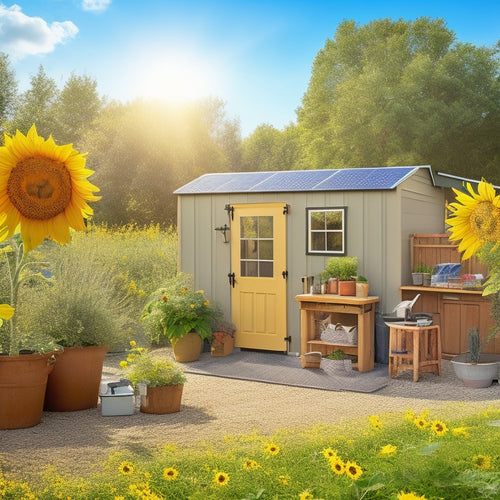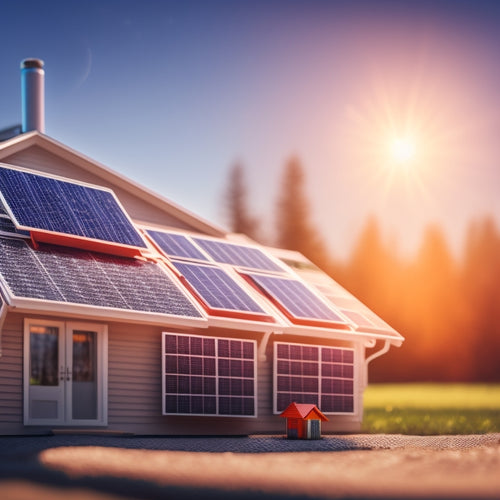
10 Best Home Energy Storage Systems
Share
You're searching for the best home energy storage systems to provide reliable backup power and promote sustainability. Top-rated battery storage options like lithium-ion and deep cycle batteries offer high energy density and long lifetimes. Integration with smart home energy management systems is essential for peak performance. Off-grid home energy solutions utilizing renewable energy sources like solar, wind, and hydroelectric power provide energy independence and reduced grid reliance. From whole house energy storage systems to solar-powered energy storage units, you'll find a range of options to suit your needs. Now, find out which systems stand out from the rest, and how they can benefit your home.
Key Takeaways
- High-depth-of-discharge (DOD) battery storage options provide more usable energy capacity and are ideal for home energy storage systems.
- Lithium-ion batteries offer high energy density, long cycle life, and advanced management benefits, making them a popular choice for home energy storage.
- Maintenance-free deep cycle batteries, like Renogy AGM, reduce electrical shock risks and are suitable for off-grid and backup power systems.
- Whole house energy storage systems integrate with the entire home electrical system, storing excess energy generated during off-peak hours for optimal efficiency.
- Government incentives and time-of-use pricing plans can offset system costs and encourage investment in cost-effective home energy storage solutions.
Top-Rated Battery Storage Options
Frequently, homeowners and businesses seeking to optimize their energy efficiency turn to home energy storage systems, and an important component of these systems is the battery storage option.
When selecting a top-rated battery storage option, you'll want to take into account a system that integrates seamlessly with your smart home energy management system. Look for batteries with high depth of discharge (DOD) ratings, as they'll provide more usable energy capacity.
Additionally, think about batteries from reliable online retailers that offer extensive warranty options, such as 10-year or lifetime warranties, for peace of mind.
It's also vital to evaluate brand reputation by researching customer feedback and product longevity.
Long-Lasting Deep Cycle Batteries
When building a home energy storage system, opting for long-lasting deep cycle batteries can greatly enhance the overall performance and lifespan of your setup.
These batteries are designed to provide a steady flow of energy over a prolonged period, making them ideal for off-grid and backup power systems. For instance, maintenance-free options like Renogy AGM reduce electrical shock risks, and lithium-ion alternatives like Battle Born 100Ah(https://www.illchanterthistlater.com) offer advanced management and lightweight benefits.
To maximize the deep cycle lifespan, it's crucial to follow proper battery maintenance tips, such as monitoring charge levels, avoiding deep discharging, and keeping the batteries at a consistent temperature.
Lithium-Ion Energy Storage Systems
You'll find that lithium-ion energy storage systems rely on a specific battery cell chemistry that enables high energy density and long cycle life. This chemistry allows lithium-ion batteries to pack more energy per unit of weight and volume, making them a popular choice for home energy storage.
As you investigate lithium-ion energy storage systems further, you'll see how their cycle life performance benefits from this chemistry, providing a reliable and efficient solution for your energy storage needs.
Lithium-ion batteries are particularly well-suited for rural electrification due to their deep cycle capabilities and ability to provide stable energy access, which is vital for essential services like healthcare and education.
Battery Cell Chemistry
By the early 1990s, lithium-ion (Li-ion) battery technology had emerged as a leading contender for energy storage systems, thanks to its high energy density, long cycle life, and relatively low self-discharge rate.
You'll find that lithium chemistry plays a vital role in Li-ion batteries, as it enables high cell efficiency and low battery degradation.
Effective thermal management is also essential to prevent overheating, which can compromise safety standards.
As you investigate Li-ion batteries, you'll come across discussions on recycling processes, which are significant for reducing waste and promoting sustainability.
Alternative chemistries, such as solid-state batteries, are being developed to enhance performance metrics like cycle life and charging speed.
Energy Density Advantages
Lithium-ion energy storage systems boast a significant advantage over other battery chemistries: their high energy density.
You benefit from a more compact system that packs a lot of power per unit of weight and volume. This means you can store more energy in a smaller space, making lithium-ion batteries ideal for home energy storage systems.
Here are three key advantages of high energy density:
-
Increased storage efficiency: With more energy stored per unit, you can power your home for longer periods during outages or peak usage.
-
Reduced footprint: Smaller systems take up less space, making them perfect for homes with limited installation areas.
-
Improved scalability: High energy density allows for more flexible system design, making it easier to scale up or down depending on your energy needs.
Cycle Life Performance
Its long lifespan is a key benefit of a lithium-ion energy storage system, and this is largely due to its impressive cycle life performance. You can expect a lithium-ion battery to last for thousands of charge/discharge cycles, making it a reliable choice for home energy storage. Cycle life is a critical performance metric, as it directly affects the overall cost of ownership and the system's ability to provide backup power when you need it.
| Cycle Life | Expected Number of Cycles |
|---|---|
| 80% Depth of Discharge (DOD) | 3,000 - 5,000 cycles |
| 50% DOD | 5,000 - 7,000 cycles |
| 20% DOD | 7,000 - 10,000 cycles |
| 10% DOD | 10,000 - 15,000 cycles |
Keep in mind that these estimates vary depending on the specific battery chemistry and operating conditions.
Off-Grid Home Energy Solutions
You're likely considering off-grid home energy solutions to utilize renewable energy sources, such as solar or wind power, to reduce your reliance on the grid.
By pairing these sources with energy storage systems, you can achieve energy independence and minimize your carbon footprint.
With a well-designed off-grid system, you can power your home efficiently and effectively, even in remote locations.
Renewable Energy Sources
Renewable energy sources have become an integral part of off-grid home energy solutions, enabling homeowners to reduce their reliance on the grid and minimize their carbon footprint.
You can employ these clean energy sources to power your home, reducing your energy bills and environmental impact.
Here are three popular renewable energy sources for off-grid home energy solutions:
-
Solar Energy: Convert sunlight into electricity using photovoltaic (PV) panels, ideal for homes with abundant sunlight.
-
Wind Energy: Apply wind turbines to generate electricity, suitable for homes with consistent wind patterns.
-
Hydro Energy: Exploit hydroelectric power from flowing water, ideal for homes near streams or rivers.
Energy Independence Achieved
Freedom from the grid's constraints is finally within reach, as off-grid home energy solutions enable you to break free from reliance on public utilities and take control of your energy needs.
You'll enjoy energy autonomy, making you less dependent on external power sources. By utilizing renewable energy sources, such as solar or wind power, you can generate electricity on-site and store it in a home energy storage system.
This setup allows you to live sustainably, reducing your carbon footprint and reliance on non-renewable energy sources. Off-grid home energy solutions provide a reliable and efficient way to power your home, giving you the freedom to live life on your own terms.
Powering Off-Grid Homes
As off-grid homes rely on self-sufficiency, their energy needs are met by capturing and storing energy locally. You're not connected to the grid, so you need a reliable system to power your home.
Energy efficiency is vital in off-grid homes, as it reduces your energy requirements and saves you money.
To achieve sustainable living, consider the following:
-
Renewable energy sources: Invest in solar panels, wind turbines, or hydroelectric power to generate electricity.
-
Energy storage systems: Use deep cycle batteries, like lead-acid or lithium-ion, to store excess energy for later use.
-
Energy management systems: Install a system that monitors and controls your energy production, storage, and consumption to optimize your energy efficiency.
Grid-Tie Battery Backup Systems
You're likely already familiar with the concept of grid-tie systems, which enable you to generate your own electricity and export any excess to the grid.
Grid-tie battery backup systems take this concept a step further by incorporating energy storage. In the event of a grid outage, these systems automatically switch to backup mode, providing power to your home. This enhances grid stability by reducing the strain on the grid during peak hours and increases energy resilience by ensuring a steady supply of power.
With a grid-tie battery backup system, you can enjoy the benefits of renewable energy while maintaining a reliable connection to the grid. These systems are particularly useful for homes with solar or wind power installations, allowing you to store excess energy generated during the day for use at night or during outages.
Renewable Energy Storage Systems
You're likely considering renewable energy storage systems to reduce your reliance on the grid and minimize your carbon footprint.
These systems seamlessly integrate solar power with battery backup systems, ensuring a steady supply of green energy to your home.
Solar Power Integration
Sustainability converges with innovation in the domain of solar power integration, where renewable energy storage systems play an essential role in utilizing the limitless potential of the sun.
You can leverage this potential by integrating solar technology with your home energy storage system, taking advantage of solar incentives and net metering to reduce your energy costs.
Effective energy management and demand response strategies guarantee grid resilience, while sustainable practices like battery recycling minimize environmental impact.
Here are three key benefits of solar power integration:
-
Reduced installation costs: Combining solar power with energy storage systems can lower overall installation costs.
-
Enhanced energy monitoring: Solar power integration allows for real-time energy monitoring, helping you optimize your energy usage.
-
Increased grid independence: With solar power integration, you can store excess energy generated during the day for use during power outages or at night.
Battery Backup Systems
Battery backup systems, a essential component of renewable energy storage systems, enable homeowners to store excess energy generated by their solar panels or wind turbines for later use.
You can think of them as a safety net, providing power during grid outages or when your renewable energy sources aren't producing.
Effective battery maintenance is critical to guarantee peak performance and lifespan. This involves monitoring battery health, updating software, and performing regular inspections.
Advanced energy management systems can also be integrated to enhance energy distribution and consumption. By doing so, you'll be able to prioritize your energy needs, reduce waste, and maximize your renewable energy output.
Green Energy Solutions
Your shift to a greener lifestyle is supported by renewable energy storage systems, which efficiently capture and store excess energy generated by solar panels or wind turbines.
These systems enable you to utilize sustainable energy from renewable resources, reducing your carbon footprint and environmental impact.
With green technology, you can enjoy eco-friendly solutions for your energy needs.
Here are three benefits of green energy solutions:
- Energy Efficiency: Renewable energy storage systems optimize energy usage, reducing waste and ensuring clean power when you need it.
- Smart Grid Integration: These systems can seamlessly integrate with smart grids, allowing for efficient energy management and distribution.
- Increased Energy Independence: By storing excess energy generated from solar or wind power, you can rely less on the grid and enjoy greater energy independence.
High-Capacity Home Battery Banks
As you investigate deeper into the world of home energy storage systems, high-capacity home battery banks emerge as an important component in maximizing your energy independence.
These banks consist of multiple batteries connected in parallel or series to achieve a higher overall capacity. Effective capacity management is vital to guarantee the longevity and performance of these systems.
You'll need to take into account factors like depth of discharge, charge cycles, and state of charge to optimize your energy storage.
Installation challenges may arise, such as guaranteeing proper ventilation, cooling, and electrical connections.
However, with careful planning and execution, high-capacity home battery banks can provide a reliable and efficient energy storage solution for your home.
Solar-Powered Energy Storage Units
While exploring home energy storage systems, you'll likely come across solar-powered energy storage units, which integrate solar panels and energy storage capabilities into a single, compact unit.
These units are designed to utilize solar energy during the day and store it for later use, reducing your reliance on the grid.
Here are three benefits of solar-powered energy storage units:
-
Increased Energy Independence: By storing excess energy generated by your solar panels, you can use it during the night or on cloudy days, reducing your energy bills.
-
Solar Incentives: Many governments offer solar incentives, such as tax credits, to encourage the adoption of solar-powered energy storage units.
-
Lower Installation Costs: Since these units combine solar panels and energy storage, the installation costs are often lower compared to installing separate systems.
Whole House Energy Storage Systems
Beyond solar-powered energy storage units, whole house energy storage systems offer a more all-inclusive approach to home energy management.
You'll benefit from a thorough solution that integrates with your entire home's electrical system, rather than just supplementing solar power. These systems typically consist of a large battery bank, an inverter, and a monitoring system.
They're designed to optimize energy efficiency by storing excess energy generated during off-peak hours and releasing it when needed. This approach enables you to reduce your reliance on the grid, minimize energy waste, and enjoy a more stable and efficient energy supply.
Affordable Home Energy Storage Options
You've invested in a whole house energy storage system, but you're still looking for ways to make home energy management more affordable.
Fortunately, there are several options to investigate.
-
Government Incentives: Take advantage of government incentives, such as tax credits or rebates, to offset the cost of your energy storage system. These incentives can greatly reduce your upfront investment.
-
Energy Efficiency Upgrades: Implement energy efficiency upgrades, like LED lighting and smart thermostats, to reduce your energy consumption. This will allow you to store excess energy generated by your system, further reducing your reliance on the grid.
-
Time-of-Use (TOU) Pricing: Opt for TOU pricing plans, which charge lower rates for energy consumption during off-peak hours. By storing energy during off-peak hours and using it during peak hours, you can minimize your energy costs.
Frequently Asked Questions
Can I Use My Existing Solar Panels With a New Energy Storage System?
You'll need to check your existing solar panels' solar compatibility with the new energy storage system, considering factors like voltage, power output, and communication protocols during installation to guarantee a seamless integration.
How Do I Know What Size Energy Storage System I Need for My Home?
You're not alone in seeking energy independence, as 1 in 5 US homeowners consider energy storage essential. To determine your energy storage system size, calculate your daily energy needs and consider battery capacity, factoring in your appliances' wattage and desired backup duration.
Are Home Energy Storage Systems Eligible for Government Incentives?
You'll be pleased to know that you're likely eligible for government incentives, such as tax credits and rebates, for investing in energy storage, which supports energy independence, optimizes system performance, and yields cost savings, with varying installation requirements and financing options.
Can I Install an Energy Storage System Myself or Do I Need a Pro?
As you venture into the uncharted territory of energy storage, you're tempted to play the hero, but beware, DIY installation can be a dangerous game, and safety concerns lurk around every corner, making it wise to call in a seasoned pro to guarantee a safe and efficient setup.
How Long Does It Take to Charge a Home Energy Storage System Fully?
You'll find that charging time depends on the system's charging speed and battery capacity, typically ranging from 2-12 hours to fully charge, with faster charging speeds available for larger battery capacities.
Related Posts
-

Is This the Future of Alternative Energy Systems
Yes, alternative energy systems are shaping the future of energy. Innovations in solar and wind technologies are driv...
-

Building an Emergency Backup Solar Power System in 5 Essential Steps
Building an emergency backup solar power system involves five key steps. First, assess your daily energy needs to ide...
-

A Beginner's Guide to Navigating the Solar Investment Tax Credit
You're eligible to claim a significant Solar Investment Tax Credit (ITC) of 30% of total installation costs, but mane...


